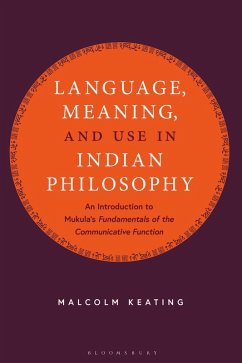
The Oxford Handbook of Japanese Philosophy (eBook, PDF)

PAYBACK Punkte
10 °P sammeln!
Japanese philosophy is now a flourishing field with thriving societies, journals, and conferences dedicated to it around the world, made possible by an ever-increasing library of translations, books, and articles. The Oxford Handbook of Japanese Philosophy is a foundation-laying reference work that covers, in detail and depth, the entire span of this philosophical tradition, from ancient times to the present. It introduces and examines the most important topics, figures, schools, and texts from the history of philosophical thinking in premodern and modern Japan. Each chapter, written by a lead...
Japanese philosophy is now a flourishing field with thriving societies, journals, and conferences dedicated to it around the world, made possible by an ever-increasing library of translations, books, and articles. The Oxford Handbook of Japanese Philosophy is a foundation-laying reference work that covers, in detail and depth, the entire span of this philosophical tradition, from ancient times to the present. It introduces and examines the most important topics, figures, schools, and texts from the history of philosophical thinking in premodern and modern Japan. Each chapter, written by a leading scholar in the field, clearly elucidates and critically engages with its topic in a manner that demonstrates its contemporary philosophical relevance. The Handbook opens with an extensive introductory chapter that addresses the multifaceted question, "What is Japanese Philosophy?" The first fourteen chapters cover the premodern history of Japanese philosophy, with sections dedicated to Shinto and the Synthetic Nature of Japanese Philosophical Thought, Philosophies of Japanese Buddhism, and Philosophies of Japanese Confucianism and Bushido. Next, seventeen chapters are devoted to Modern Japanese Philosophies. After a chapter on the initial encounter with and appropriation of Western philosophy in the late nineteenth-century, this large section is divided into one subsection on the most well-known group of twentieth-century Japanese philosophers, The Kyoto School, and a second subsection on the no less significant array of Other Modern Japanese Philosophies. Rounding out the volume is a section on Pervasive Topics in Japanese Philosophical Thought, which covers areas such as philosophy of language, philosophy of nature, ethics, and aesthetics, spanning a range of schools and time periods. This volume will be an invaluable resource specifically to students and scholars of Japanese philosophy, as well as more generally to those interested in Asian and comparative philosophy and East Asian studies.
Dieser Download kann aus rechtlichen Gründen nur mit Rechnungsadresse in A, B, BG, CY, CZ, D, DK, EW, E, FIN, F, GR, HR, H, IRL, I, LT, L, LR, M, NL, PL, P, R, S, SLO, SK ausgeliefert werden.













